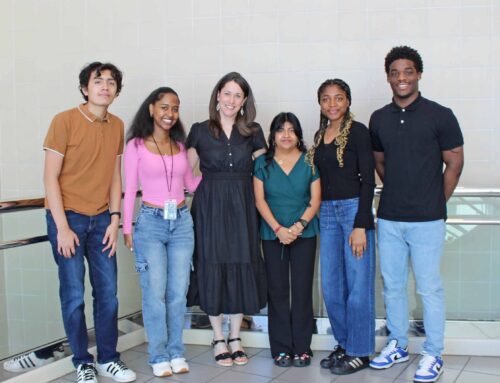
Zach Garza and Jonathan Hafemann founded a program to help young men like Twquan Clayton (middle). Photo by Danny Fulgencio.
About half of the boys on the LHJH football team live in homes with no male role model. One coach decided to do something about that.
Zach Garza once was very angry about growing up without a father. That is something he shares openly these days.
“My dad left the family when I was in junior high. I was lost because of that,” Garza says. “I have experienced the anger and loneliness, the questioning of masculinity and constant search for love and acceptance that comes from fatherlessness. I didn’t know what it looked like to be a man and I struggled with those issues into my college years.”
Then, with the help of mentors, he says, he worked through the pain, and broke free from the “chains of anger, guilt and fear.”
Today, as a coach and teacher at Lake Highlands Junior High, Garza sees himself in many of his students.
“Out of 65 kids on the [football team], half of them came from homes without a male figure in the home,” Garza says.
One of those kids was a soft-spoken 13-year-old named Twquan Clayton, now a student at Lake Highlands Freshman Center.
Clayton is one of the first members of the Forerunner Mentoring Program, which Garza founded as a way to guide young men to a better, more-responsible adulthood.
“Coach Garza was a man I felt I could talk to,” Clayton says. “He told me about [the program] and said he wanted me to try it, so he partnered me with Jonathan.”
Clayton’s mentor, Jonathan Hafemann, is the Forerunner program’s director, who collaborated with Garza after they learned, through their church pastor, of their mutual interest in helping fatherless adolescents.
“My story is a little different than Zach’s,” Hafemann says. “I grew up with a loving father, but my own father had a deep wound created by the fact that his own father had abandoned him.”
Clayton wasn’t sure about his mentor at first, he admits.
“He told me about himself and about his dad and how his dad was always there for him, and I thought, ‘How is this for me?’ I had my doubts.”
But as they got to know each other, Clayton and Hafemann bonded.
“Now, we can talk about anything,” young Clayton says, smiling at his newfound big-brother figure.
The Forerunner program doesn’t involve special events, necessarily, but revolves around day-to-day activities and learning by observing. Mentors make a commitment to spend time with the young men twice a month and to make contact by phone, email or letter on the weeks in-between visits. Five or so times a year, the student and mentor will have opportunities to attend events sponsored by Forerunner and engage in group activities.
Not by preaching, but rather by example, mentors teach social skills — such as making eye contact and shaking hands when you introduce yourself — as well as good judgment when it comes to key areas of adolescent life, including relationships with women, work ethic, spirituality and education.
Garza says the mentees learn by having a role model to emulate.
“More is caught than taught,” he explains.
Mentorship, while a big commitment, brings far-reaching rewards, the founders of Forerunner say. By investing time in a young man, mentors really are helping to build a stronger community, Garza says.
“Our goal is for mentors to invest in the students of Lake Highlands, so they can go out and change the destinies of their children and future generations. We hope the cycle of fatherlessness will end with each child we invest in.”
Learn more about mentorship at forerunnermentoring.com.





